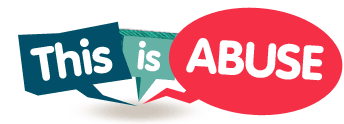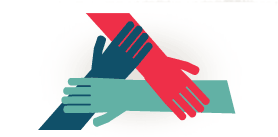SOME FREQUENTLY ASKED QUESTIONS
Below you'll find answers to all the most commonly asked questions about abuse in relationships. If you can't find the answer you need then please click here to see a list of registered charities that can help you.
What is abuse?
Abusive behaviour can be:
• violent (hitting, kicking, slapping)
• emotional (humiliating and putting you down)
• sexual (forcing you to do sexual acts you don’t want to)
Abusive relationships can start with verbal or emotional abuse and could happen to anyone (including those in same-sex relationships). It can often escalate into physical abuse, by which time your self-esteem is likely to be damaged.
Some warning signs of potential violence and abusive behaviour are:
• extreme jealousy
• anger when you want to spend time with your friends
• isolating you from friends and family
• trying to control your life (how you dress, who you hang out with and what you say)
• humiliating you, putting you down
• threatening to harm you or to self–harm if you leave them
• demanding to know where you are all the time
• monitoring your calls and emails, threatening you if you don’t respond instantly
• excessive alcohol drinking and drug use
• explosive anger
• using force during an argument
• blaming others for his/her problems or feelings
• being verbally abusive
• threatening behaviour towards others
How can I keep myself safe when out and about?
Here are some safety tips that you might find useful when out and about:
- Be clear about where you are going, who you are with and how you will get home
- Let others know if you are feeling uncomfortable or uneasy in a situation
- Know your boundaries and be comfortable about expressing them
- Be aware! Drink and drugs can affect your reactions as well as your ability to be alert
- If you are using the internet, be very careful with who you are chatting to online. Unfortunately there are people out there who use the internet as a way of meeting young people purely for the purposes of sexual assault or rape. If you do make friends online and you want to meet them you should definitely tell an adult about plans.
I THINK MY FRIEND IS BEING ABUSED BY THEIR PARTNER. WHAT SHOULD I DO?
If you think you can spot some of the warning signs of abuse in your friend’s relationship, the person who is being abused needs professional help and your encouragement and support to stop it.
Approach the subject in a sensitive way, such as saying ‘I am worried about you because….’. Let them know that the abuse is not their fault, it’s unacceptable and that support is available.
It can be useful to think up a code word that they can use on the phone to let you know they need help.
Don't ignore the issue if you think it is happening. When you try to talk to them, try not to make them feel judged as it takes courage to admit abuse.
Encourage them to talk to a trusted adult, and if their partner has been violent or forced them to have sex, encourage them to talk to the police. You shouldn’t confront their partner on your own and neither should your friend.
If your friend wants to speak to someone in confidence encourage them to contact these helplines:
For girls - National Domestic Violence Helpline 0808 2000 247
For boys - Respect 0808 801 0327
Childline 0800 11 11
WHAT IS STALKING AND WHAT SHOULD I DO IF THIS IS HAPPENING TO ME?
Stalking is one of the most common abusive behaviours. If you’re being stalked it can be very frightening. You can be stalked by a partner or ex-partner as well as strangers.
Stalking can mean all kinds of behaviours such as:
• regularly sending unwanted flowers or gifts
• frequent unwanted contact in person, by telephone, online or emails
• damaging property
• harassment of people close to you
• physical or sexual assault
If the behaviour is persistent, clearly unwanted and causes you fear, harassment or anxiety, then it is stalking and you don’t have to live with it.
If you feel you’re in danger, call the police on 999 at any time.
You can also ring The National Stalking Helpline on 0300 636 0300 or visit:www.protectionagainststalking.org/node/22 or
www.stalkinghelpline.org/about-the-helpline/who-are-we/
MY PARTNER OFTEN HUMILIATES ME IN FRONT OF THEIR FRIENDS. IS THIS NORMAL?
It can be very hurtful when someone you care for treats you badly. Your partner could be a bully one moment and nice to you the next, but if someone really likes or loves you, they should always treat you with respect. Controlling, teasing, bullying and humiliating are all forms of emotional abuse. Staying in a relationship where you are being emotionally abused could cause you to lose your self-esteem and confidence. An abusive, violent or controlling relationship is not normal or acceptable; nobody needs to tolerate this behaviour and if the bullying is making you worried you need to speak to a trusted adult. If you need to talk to someone in confidence contact Childline on 0800 11 11, or visit www.thehideout.org.uk
I’M A MALE VICTIM OF ABUSE – WHAT SHOULD I DO?
Abuse can happen to anyone including men. If your partner is violent, controlling or sexually abusive try talking to a trusted adult. If you can’t do this call the helpline for males experiencing domestic abuse on freephone 0808 801 0327, emailinfo@mensadviceline.org.uk or visit www.mensadviceline.org.uk
HOW DO I END A VIOLENT RELATIONSHIP?
It can be very hard deciding to leave a relationship, no matter what’s happened. If you’ve experienced relationship abuse it can be even harder. You may be worried about what your partner will say or do, so it’s really important that you talk to someone about what you’re planning to do and try not to end the relationship when you are on your own with your partner. You may want to keep a bag of things (like clothes, passport, and important documents) with a friend so that they are there if you need them. Remember, you deserve to be safe and there is help and support available.
You can find more information and a safety plan here:http://www.respectnotfear.co.uk/keepingsafe/59-difficult-to-leave.html
If you’re a girl, call Refuge 0808 2000 247. Boys can call Respect on 0808 801 0327.
Ending a relationship can be difficult and upsetting but if you’re being abused it’s important for your long-term physical and mental health that you end the relationship. All physical or sexual abuse is illegal (it doesn’t matter that you are dating) and you must always report it to the police or a trusted adult.
I’M BEING ABUSED. IS MY PARTNER'S BEHAVIOUR MY FAULT?
Nobody deserves to be abused. It’s never your fault or “just the way things are”. Abuse will have a long-term effect on your confidence and can lead to depression, isolation and ill health. If you are being abused tell a trusted adult or contact any of the following helplines in confidence: For girls - National Domestic Violence Helpline 0808 2000 247 For boys - Respect 0808 801 0327 - Childline 0800 11 11- The Samaritans 08457 90 90 90
Does relationship abuse only happen between boyfriends and girlfriends?
No. Relationship abuse can happen to anyone, including those who are in same sex relationships. If you are a male victim of abuse you can get information and advice from Respect on 0808 801 0327 (free from landlines and most mobiles open Monday - Friday 10am - 1pm and 2pm - 5pm). If you are in a same sex relationship and you recognise some of the signs of abuse, contact Broken Rainbow www.broken-rainbow.org.uk
Is abuse against the law?
Many abusive behaviours in relationships are against the law. For example, if your partner hits you, it’s assault. If they force you to carry out sexual acts or force you into sex, this is sexual abuse or rape. Being threatened or harassed by a partner is just as much a crime as violence from a stranger. If this is happening to you do not confront your partner on your own. Please speak to a trusted adult or the police.
My partner checks my text messages all the time. Is this abuse?
If your partner tries to control you by checking your text messages and wants to know who you are with all the time, you need to do something about it. This is controlling behaviour that can escalate from verbal and emotional abuse to physical violence. If your partner is extremely jealous and controlling this will have an impact on your mental and physical health. If their controlling behaviour gets worse you have to think about ending the relationship, but don’t confront them on your own.
My boyfriend says everyone is having sex but I still don’t feel ready. What should I do?
It is a common myth that “everyone is doing it”, but the average age for having sex for the first time is 16. Many people wait until they’re older. Even if you’ve had sex before it doesn’t mean you have to rush into doing it with your current boyfriend. Sexual relationships come with risks such as unplanned pregnancy and sexually transmitted diseases and you always have the right to withhold concent. If he cares for you he will understand why you want to wait. If you are under 16 it’s against the law for you to have sex. If your boyfriend is older than 16 he could be charged with rape if you enter into a sexual relationship with him. If you’ve been forced by your boyfriend to have sex against your will (or suffered any form of sexual abuse) then this is rape (it doesn’t matter that you are going out with each other) and you need to inform a trusted adult. If you want to speak to somebody in confidence contact Rape Crisis on 0808 802 9999.
My partner is abusive, but at least I’ve got a partner, right?
Nobody deserves to be abused. It is far better to be single than have a partner that hits or verbally abuses you. Being in an abusive relationship can lead to long-term problems with your emotional and physical health. You have the right to be treated with respect. If you are in abusive relationship there is a lot of support available to you. Find out more here.
I am in an abusive relationship. Where do I go for help?
If you are in an abusive relationship never confront your partner on your own. Try speaking to a trusted adult (family member, teacher, youth worker). If you would rather speak to someone in confidence we have a list of agencies that can help you here.
Abuse can happen to anyone, including men. If your partner is violent, controlling or sexually abusive, try talking to a trusted adult. If you don’t think you can do this, you can speak in confidence using the helpline for males experiencing domestic abuse. Call freephone 0808 801 0327, email info@mensadviceline.org.uk or visit www.mensadviceline.org.uk


